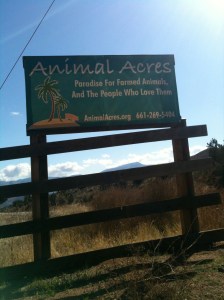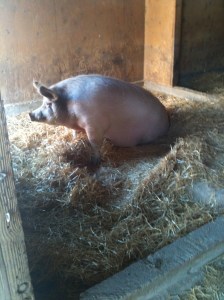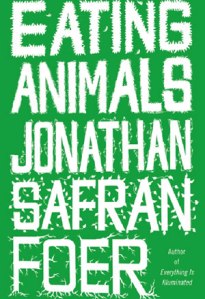Dear Mr. Gold,
I’m not sure what an open letter is but I think this counts as one. As I’m sure you recall, I tweeted you a 2007 video showing abominable conditions at a Canadian foie gras producer and you replied back to me and said that this video was “outdated, irrelevant propaganda” and that “all 3 US producers are impeccable.” Then I sent you a recent video of conditions at the three U.S. foie gras producers – with some of the footage being as recent as late 2011 – and you went silent. It wasn’t surprising in a way, given that there’s no definition of “impeccable” that would allow for the conditions seen in that footage.
But don’t you think you owe it your 30,000 followers on Twitter whom you told that the U.S. producers are “impeccable” to then either defend those producers or admit you were wrong? Don’t you think it’s cowardly to accuse me of sending you “outdated, irrelevant propaganda” and then when I send you a new video that’s current and couldn’t be more relevant, I’m met with radio silence?
I also found it surprising that you used the word “propaganda” – such a meaningless word thrown about by both sides in any argument. Propaganda is in the eye of the beholder, isn’t it? Even facts can count as propaganda. If your purpose was to be harsh by using such a word, then I don’t mind, since I was harsh in my first few tweets to you as well. But if that was a heartfelt use of the word then I find it very disingenuous. Especially after the second video I sent you.
I was also troubled by what was implied in your tweets, which was that you DO have concern for the animals that become foie gras and that that’s why you were certifying the U.S. producers as “impeccable.” But DO you really care? Does this mean that you always check the provenance of foie gras before partaking? Does it mean you did not eat foie gras a few years ago when conditions were like those seen in the video you called “outdated”?
I took a look at the menu for Umamicatessen, where you enjoyed the foie gras donut featured in your adoring review in the Los Angeles Times (which didn’t even mention that foie gras is soon to be illegal in the state of California, though that’s even more your cowardly editors’ fault than your own). Well, it turns out the menu for Umamicatessen does not describe the provenance of the foie gras used in their donut. Did you ask them? I would guess you did not, even though your tweet to me suggested that you ARE concerned about such things. Did you make a reasonable effort to guarantee that the foie gras you were about to consume came from one of the three “impeccable” U.S. producers?
Aren’t you being a phony here, Mr. Gold? Trying to act like you indeed are concerned about the welfare of these animals and the conditions at the various production farms, and yet not really checking, and possibly never being concerned enough to check before partaking?
I also imagine that you roll your eyes at the upcoming ban on foie gras and see it as the work of pandering politicians and a misinformed and hysterical electorate, without stopping to think that this was not a measure to ban all meat, which would have gotten very little support, but a measure to ban a form of meat that is created in a way that is particularly cruel for the animals whose livers are taken.
As I said in one of my tweets to you, I wonder if you have a family cat or dog and if you’ve ever taken a moment to think about how you’d feel if someone shoved a long metal pipe down its throat the way that foie gras producers do to their animals.
Your writing is all about pleasure, about how food, well-prepared, can afford us one of the greatest delights that humanity has to offer. But do you ever take a moment to think about the lives of the animals that become this food? I know that’s tough to do, Mr. Gold, because I was a meat eater for close to half a hundred years. I was in denial, too. I occasionally heard about or saw the undercover videos revealing conditions at factory farms, but I chose to ignore them or to imagine them to be isolated incidents. Most likely I simply tuned it out before it was ever capable of gaining a toehold in the part of my brain that thinks about things.
But I was not a food writer for a major American newspaper, yet alone a Pulitzer Prize winner, so I did not have the professional obligation to consider the topic from multiple angles and in great detail.
What you are is an enabler. You enable people to view the mistreatment of these animals as something they needn’t ethically concern themselves with, to view it as something insignificant when compared to the end that justifies these means: a sumptuous donut. After all, here is a prize-winning writer at a bastion of American journalism giving the continued consumption and treatment of these animals his imprimatur.
You spend your days seeking out new and mind-blowing tastes, which is fine, hey, it sounds like a great job, but think about what it rides on the back of. I stopped eating animal products after reading Jonathan Safran Foer’s “Eating Animals” book. Perhaps you consider that to also be “outdated, irrelevant propaganda” never mind the fact that Safran Foer, one his generation’s leading literary figures, took two years out of his life to research and write this book.
And Mr. Safran Foer, to my knowledge, is not a vegan. He is a self-described vegetarian, and according to his book, an on and off one at that. Perhaps you have read his book, which would come as a pleasant surprise. If not, you should, unless you fear, as I think you may, that it would lead you to stop eating meat and perhaps all animal products.
While I don’t eat meat anymore I am not someone who actively advocates for others to stop. My family and friends still eat meat and I do not attempt to proselytize them. I only bothered tweeting you in the first place because I found your foie gras donut orgasm to be so brazen and defiant and, well, hard-hearted. It was, to my mind, a political statement: I will eat whatever I god damn please.
I have tried to refrain in this letter from making analogies. The atrocities carried out on factory farms on a regular basis can be compared to many things, but those who defend meat are quick to accuse those who compare things of equating things. I’m sure you and they might even take offense at the use of the word “atrocities” to describe such treatment, thinking that word should only be reserved for human mistreatment. But if you’re going to throw around the word “propaganda” like a political hack on a cable news show then I have no problem using a word like “atrocities.”
As I mentioned in my tweets, I’ve been a big fan of your writing for years. Not that you need me to tell you that; you’ve got thousands of fans and a Pulitzer Prize. But don’t you believe that such a prize, especially a journalistic prize, comes with obligations and responsibilities, especially concerning honesty? And not just being honest with me, I wouldn’t expect you to care about that, but I’m talking about being honest with those 30,000 followers you told about the “impeccable” U.S. foie gras production. I can’t imagine that any of those 30,000 followers who watched the second video I sent you would think those conditions were anything but appalling, yet alone “impeccable.”
One of the major changes underway at this time in America, Mr. Gold, is a reconsideration of how we treat the animals that become our food. I wouldn’t expect you to be as contemplative a meat-eater as someone like Mark Bittman, whose recent New York Times columns have been in the vanguard of this current reassessment, but to blast out a blowhard huff about “outdated, irrelevant propaganda” when you and your bloodied-apron friends are about the only ones left defending this fort seems like the behavior of a spoiled little child.
If you consider yourself an intelligent person, which you no doubt do, and which I no doubt consider you to be as well, then the problem here must not be intellectual but rather psychological. Beyond the fact that you make your living writing about food, the great proportion of which comes from animals, there seems to be an unhealthy refusal to reconsider your current positions.
Were you to begin to question the ethics of eating meat, or even the tiny fraction of meat consumption that is foie gras, perhaps you fear your whole world would unravel. Foodie friends would abandon you. The industry you embrace would brand you a traitor. You would have to, gasp, refrain from certain things you find to be delectable! But delectability at what cost?
It seems pretty clear what direction the world is moving in, and on what side of history you will be left on, and there were no doubt many Pulitzer Prize winners who won for columns that would now make our skin crawl in 2012.
Again, not that you care about that. But you should care about the obvious. You should be better than the typical American who eats meat out of habit, who doesn’t think much at all about their food or where it comes from or how it’s made, who isn’t one of the country’s leading food figures, and who spend most of their lives eating food you probably wouldn’t even want if trying to survive a plane crash.
Take some time, Mr. Gold. Re-think your positions. Then please get back to me. Thanks.
Tags: California, California foie gras ban, foie gras, foie gras ban, foie gras donut, food critic, food writing, foodie, Jonathan Gold, Jonathan Gold foie gras, Jonathan Gold Pulitzer, Jonathan Gold vegan, Jonathan Safran Foer, LA Weekly, Los Angeles, Los Angeles Times, Mark Bittman, Mark Bittman vegan, New York Times, Pulitzer, Pulitzer Prize, U.S. foie gras production, Umami, Umamicatessen





